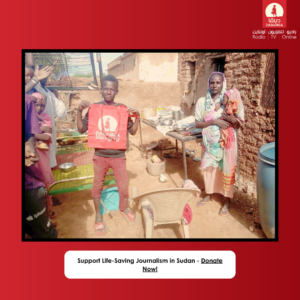RWB: ‘Increase in free speech violations by Sudan’s NISS’
International media freedom watchdog Reporters Without Borders (RWB*) has voiced concern about an increase in free speech violations by Sudan’s National Intelligence and Security Service (NISS) since May, including seizures of newspaper issues, arbitrary arrests, interrogations and prosecutions.
International media freedom watchdog Reporters Without Borders (RWB*) has voiced concern about an increase in free speech violations by Sudan’s National Intelligence and Security Service (NISS) since May, including seizures of newspaper issues, arbitrary arrests, interrogations and prosecutions.
In an article published by RWB today entitled Sudanese intelligence agency’s offensive against journalists, RWB says it is “worried”:
One of the latest examples of abuse of authority and violation of the freedom to inform was the seizure, as reported by Radio Dabanga, by the NISS of the entire print-run of the El Sayha newspaper on August 20. “As usual, no reason was provided,” the Sudanese Journalists Network (SJNet) said in a communiqué.
As well as questioning and detaining journalists, the NISS often confiscates newspaper issues that annoy the regime. RWB has condemned this practice in the past, in part because it has grave financial consequences for the targeted publications.
The print-runs of two sports daily, El Zawia and El Zaeem, were confiscated as they came off the press on July 10 because they mentioned a FIFA decision to suspend the Sudan Football Association. An issue of the newspaper El Jareeda was also seized in July when it published an editorial criticizing NISS brutality.
Individual journalists have been harassed over their articles. Hanadi El Siddig, the journalist who wrote the offending column in El Jareeda, was summoned and questioned twice by the NISS, on July 13 and 14, after the seizure. She said that on both occasions she was subjected to extensive intimidation about her views.
Interrogations and prosecutions
The various branches of the NISS have vied with each other in recent months in their efforts to crack down on coverage of social unrest. In July, RWB registered six cases of journalists being subjected to heavy-handed NISS interrogation, often without any charge being brought against them.
Sudanese journalist Alaeldin El Defeina was held for more than a month at the NISS office in Khartoum-North, after being expelled from Saudi Arabia, where he had been detained for several months.
According to the information obtained by RWB his deportation was the result of an agreement between the Saudi intelligence services and the NISS, which proceeded to interrogate him about the articles he wrote for various online media during the 2016 civil disobedience campaign in Sudan. Often arrested in the past, Aldefeina had fled Sudan after being threatened and tortured.
“Such measures against journalists are unacceptable,” RWB said. “The NISS must stop trying to intimidate media that just provide information on subjects of interest to the public. It is the NISS agents, not journalists, who should be arrested and prosecuted so that they realise they cannot continue to act with impunity.”
Annoying subjects
Typically, it is coverage of police violence, protests by activists or government corruption that prompts the NISS to move against journalists.
Abdellatif El Daw, El Midan’s correspondent in the southeastern city of El Gedaref was detained by the NISS on July 26 while covering a protest by teachers demanding payment of their salaries.
Amel Habani, a reporter for the online newspaper El Taghyeer and an Amnesty International laureate, was sentenced on July 10 to a fine of 10,000 Sudanese pounds or a four-month jail term for allegedly obstructing a NISS agent in the course of his duties in March.
The alleged obstruction occurred after a trial of civil society activists. When the agent tried to grab the phone she was using to take photos, she asked to see his ID. He reacted by hauling her off to a NISS office and beating her there.
Osmani Mirghani, the editor of the El Tayar newspaper, and Inaam Adam, one of his reporters, have been repeatedly interrogated at NISS offices in an attempt to make them reveal their sources for a December 2016 article about Sudan’s illegal exports of radioactive material. They have also been the subject of judicial proceedings since May.
Sudan is ranked near the bottom of RWB’s 2017 World Press Freedom Index (174th out of 180 countries) while its president, Omar Al Bashir, is on RWB’s list of predators of press freedom.
*Reporters Without Borders (RWB)/Reporters Sans Frontières (RSF) is an international NGO specialising in the defence of media freedom, which it regards as the basic human right to be informed and to inform others.











 and then
and then